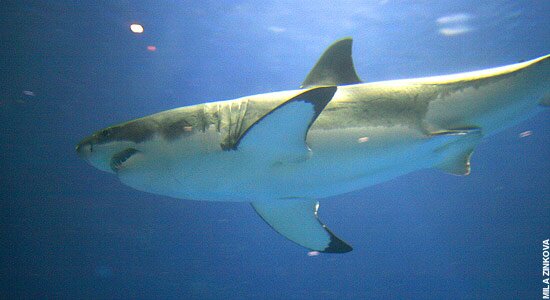A couple of stories in the press today caught my eye. Both are about what we internally refer to as ‘charismatic megafauna’ (the big animals people tend to be interested in and care about), but they are also both damning indictments of our failure to protect our oceans and the life that depends on them.

Great white shark: Many sharks are killed as fishing bycatch or for their valuable fins
Firstly – in the week of the International Whaling Commission meeting in Madeira, Portugal – whilst lots of countries get together to talk lots and try not to upset each other too much, the BBC reports that a highly-endangered species of porpoise is being pushed ever closer to extinction.
In a world panicking about recession and swine flu the conservation of this highly-endangered species is dropping off the priority list.
The Vaquita (the name means ‘little cow’ in Spanish) is one of the world’s smallest cetaceans (the family that includes whales, dolphins and porpoises) … and it gets much less air time than its bigger, more familiar cousins.
Yet it is really on the edge. It is the unwitting victim of bycatch in fisheries – something dolphin and porpoise lovers are all-too-familiar with in UK waters. And in late 2007 scientists warned that unless action was taken, the species could be extinct in just a few years.
But just in case you are rolling your eyes at the thought of Greenpeace being concerned about ‘cuddly’ porpoises – think on, as the news reports today are awash with dire warnings on more contentious oceanic animals too.
A new study shows that over a third of the world’s open ocean sharks are now threatened with extinction, including widely-recognisable species like hammerheads and great whites (There’s a nice photo gallery showing them off over on The Guardian website).
The major threat? Why, it’s destructive and unsustainable fishing practices – killing sharks as bycatch, and targeting them for their valuable fins. This of course is why we’ve been campaigning on tinned tuna – an industry which can have a dramatic impact on sharks, as well as turtles and other species.
Thankfully it is now quite easy to find pole-and-line caught tuna in the UK – caught using the most environmentally-friendly method - but the rest of the tuna industry still has a long way to go.
Sharks and porpoises are particularly vulnerable, being long lived, slow-growing animals. But they are also critters that people at least can recognise and express an interest in. If we can’t do right by those ones, what hope is there for the less charismatic inhabitants of our oceans
- Willie MacKenzie is part of Greenpeace’s Ocean Campaign. This blog post originally appeared on the Greenpeace UK website.
![]()



I enjoy watching the documentaries about sharks, in particular the large sharks. I cannot help but hope there is some monster shark in the depths as yet undiscovered.